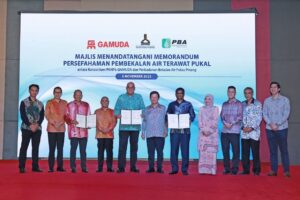
KUALA LUMPUR: Malaysia’s trade with the United States (US) surged 15.4% to RM270.88bil from January to September this year, up from RM234.68bil in the same period last year, says Tengku Datuk Seri Zafrul Abdul Aziz.
Given this substantial trade volume, the Investment, Trade, and Industry Minister stated that any modifications to US trade policy, especially the implementation of retaliatory tariffs against Malaysia, would have a direct impact on the nation’s economy and interests if not carefully managed.
“If Malaysia had chosen not to negotiate or had imposed retaliatory tariffs against the United States, it could have had negative repercussions, jeopardising export markets worth RM198.65bil across various sectors that support the Malaysian economy, including SMEs, and affecting millions of workers in the country,” he said in a parliamentary written reply to a question raised by Datuk Seri Ismail Sabri Yaakob (BN-Bera).
Ismail Sabri had asked Miti to state the impact of the new tariffs announced by US President Donald Trump on bilateral trade between Malaysia and the United States.
In light of the importance of Malaysia-US trade and investment relations, the government has adopted a whole-of-government approach to address the United States countervailing tariff issue, Tengku Zafrul said.
“Through Miti, the government pursued trade diplomacy negotiations to safeguard national interests without compromising Malaysia’s economic priorities, while maintaining strategic trade and investment ties with the United States.
“This approach proved successful when negotiations were concluded and signed between the Prime Minister and the US President on Oct 26 2025, whereby the countervailing tariff imposed on Aug 1 2025, was maintained at 19%,” he said.
He further explained that the imposition of high reciprocal tariffs, for instance, a 25% tariff on July 7, if not managed carefully through negotiations, is expected to directly affect demand for Malaysian products in the United States market.
“This is because higher tariffs would make local goods less competitive in the United States, while United States importers are likely to pass the additional tariff burden onto Malaysian exporters,” he said.
He also listed down the significant impacts of high tariffs, including reduced or cancelled orders for Malaysian products due to higher prices compared to similar goods from countries enjoying lower tariff rates.
“Consequently, local producers will face pressure to lower prices to maintain demand from the United States, which, in the long term, will affect profitability, resilience, and business sustainability,” he said.
It could also have a potential negative impact on the national economy, as both local and foreign companies operating in Malaysia may resort to cost-cutting measures, including reducing their workforce or postponing expansion plans, the minister said.
“Worse still, investors might relocate operations to countries subject to lower countervailing tariffs or offering a more conducive investment environment,” warned Tengku Zafrul.
Based on data from the Statistics Department, an estimated 7,700 local companies were involved in export activities to the United States in 2024, employing about 1.1 million workers, with the electrical and electronics (E&E) sector as the primary contributor, said Tengku Zafrul.
The Madani government, he added, will continue to strengthen the country’s export competitiveness by enhancing the national export ecosystem under the National Trade Blueprint (NTBp) and the New Industrial Master Plan (NIMP) 2030, in line with the aspirations of the 13th Malaysia Plan (13MP).
“Under these initiatives, Malaysia’s total exports are projected to exceed RM2 trillion by 2030, with an average annual growth rate of 5.8% over the next five years.
“Consistent with 13MP’s aspirations, the government will intensify the implementation of export promotion programmes to achieve these targets and ensure the nation’s continued economic development,” he said.






